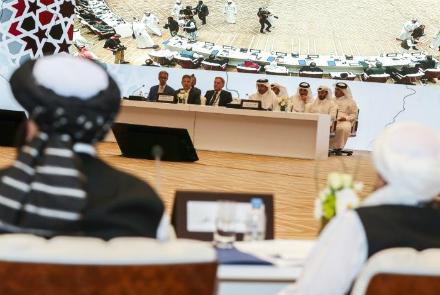A group of 17 members of the Taliban who met with at least 60 delegates from Kabul in Intra-Afghan Dialogue Conference on Peace in Doha agreed to reduce violence by stopping attacks on “religious centers, schools, hospitals, educational centers, bazaars, water dams and workplaces”.
The agreement came in the form of a resolution prepared by a committee of six members from Kabul and three members from the Taliban.
The participants from Kabul were from politicians, civil society members, and government officials – but they attended the intra-Afghan talks with their personal capacity.
According to a resolution issued by the Doha conference delegates on Monday night, the two sides have agreed on the following points to reach a sustainable peace.
• Consensus on all-inclusive Afghan negotiations.
• All Afghans are committed to a united and Islamic country, putting aside all ethnic differences.
• Afghanistan shall not witness another war. The international community, regional and internal elements shall respect Afghans’ values accordingly.
• In order to facilitate effective intra-Afghan talks, the warring parties should avoid threats, revenge and conflicting words and shall use soft words.
• The Doha peace conference participants strongly support the ongoing peace talks in Doha and believe that effective and positive outcome from the talks will benefit Afghanistan.
• Following steps should be taken to build a trust environment for peace and keep the nation safe from the war and its consequences. (a) – Unconditional release of elder, disabled and ill inmates. (b) – Ensuring the safety of public institutions including schools, madrassas, hospitals, markets, water dams, and workplaces. (c) – Respect educational institutions. (d) – Respect and protect the dignity of the people, their life and property and minimize civilian casualties to zero.
• Assuring that women’s rights are ensured in political, social, economic, educational and cultural areas within the framework of Islamic values.
• Agreeing on a roadmap for peace based on the following conditions:
1. Institutionalizing Islamic system in the country.
2. Start of the peace process simultaneously with the accomplishment of all terms and conditions set forth.
3. Monitoring and observation of the peace agreement.
4. Required reforms and support of basic institutions, defense and other institutions which are belonged to Afghans.
5. Repatriation of migrants and return of internally displaced persons (IDPs).
6. Support and assistance from donor countries for a peace agreement based on the new cooperation and relations.
7. Insist during international conferences regarding the assurance of Afghanistan’s peace agreement.
8. Assurance on zero interference from neighboring and regional countries in Afghanistan’s affairs.
• We urge the Organization of Islamic Cooperation, the United Nations, the European Union and Afghanistan’s neighboring countries to approve and support the joint resolution of the Intra-Afghan Dialogue Conference on Peace in Doha.
The members of the committee included Nader Nadery, Habiba Sarabi, Muhayuddin Mahdi, Omar Zakhilwal and Lotfullah Najafizada, who represented the Kabul delegates. Meanwhile, Amir Khan Mutaqi, Shahabuddin Delawar and Salam Hanafi were representing the Taliban.
Germany’s Special Envoy Markus Potzel said at the conclusion of the meeting that the Doha conference is a success and that one of the most important points of the joint statement is the promise of reduction of the violence in Afghanistan.
“I would like to thank all participants for their constructive engagement and for taking on this responsibility for your country and especially one phrase and part of this joint statement is very important, with most important one, in my opinion, that’s the appeal and promise to reduce violence in Afghanistan,” he said. “I hope this is the starting point for a comprehensive and meaningful peace process. I will encourage all participants to meet again in this format to further and deepen your discussions.”


